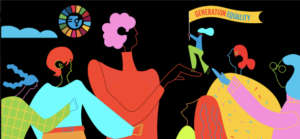Rukia*, a seventeen-year-old Form three girl from a rural area in the coastal part of Kenya, found out she was pregnant after the holidays back in 2019. The ‘nurse’ she approached at a nearby clinic mentioned that the pregnancy meant she must drop out of school. She was scared and confided in her friend, who noted that she could drink high concentrated tea to induce an abortion. Rukia took the tea, determined to end the pregnancy. She also bleached and inserted a hanger in her vagina. When she started bleeding profusely, she was taken to a nearby private clinic, where the unqualified doctor mishandled her. Rukia died as she was being transferred to the Kwale District Hospital.
Rukia’s life was cut short because she got the wrong information and was treated by an unqualified health professional costing her life. Rukia story is not an isolated case; many women and girls lose their lives every day due to unsafe abortion complications. Marie Stopes International estimates that 2,600 women and girls die from unsafe abortions annually- an average of seven deaths a day in Kenya. Nearly 120,000 women are hospitalized each year due to abortion-related complications.
Despite these numbers and horrific experiences, Kenya is among 33 member states, including 16 from Africa who supported the Geneva Consensus Declaration (GCD). The accord was President Trumps last kick at the rights of millions of girls and women across the world to access a safe abortion in October 2020.
The GCD allows member states not to acknowledge the right to abortion as a sexual and reproductive health and rights issue. This is very dangerous politicking that costs women and girls their lives. It allows governments to ignore causes of maternal mortality and morbidity in Kenya and Africa, including postpartum haemorrhage and unsafe abortion complications.
Even with the withdrawal of the United States’s signature to the GCD, Kenya is yet to denounce this Declaration. GCD is flawed because it violates abortion rights which are human rights enshrined in the Constitution of Kenya, and international conventions, treaties and declarations that Kenya has ratified. It discriminates against the most vulnerable who cannot afford the costs of bypassing such policies in the health system to afford a safe abortion.

The United Nations Human Rights Committee’s General Comment on the Right to Life asserts that “State parties may not regulate pregnancy or abortion in all other cases in a manner that runs contrary to their duty to ensure that women and girls do not have to undertake unsafe abortions, and they should revise their abortion laws accordingly”. In other words, states must have policies and laws that help women seek safe abortion services rather than seek unqualified medical professionals risking their lives.
In Kenya, unsafe abortion complications are the second leading cause of maternal mortality, and the refusal of the government to formulate and implement policies that protect women’s and girl’s rights to sexual and reproductive health is appalling. Women and girls die every day due to unsafe abortion complications. According to Guttmacher Institute, women who sought out abortion-related care in Kenya were socially, demographically and economically heterogeneous. They include uneducated and educated women, those living in rural and urban areas.
If women are not able to decide when with whom and how many children to have, they will face few opportunities to access education, financial independence and overall well-being. That is why abortion is a human right issue. Women and girls will always need abortion care services, and criminalizing it does not necessarily reduce or stop abortion from happening. Women continue seeking these services, and when they do not find safe options, they end up using unsafe options hence putting their lives at risk.
Restrictions and resistance to abortion also exist to deny comprehensive sexuality education and contraception information for young women, which would significantly decrease the number of unwanted pregnancies. Evidence shows that when adolescents access comprehensive sexuality education, they delay their sexual debut and make informed sexual choices. Policies that deny women and girls’ decision-making subject women and girls to inhuman, degrading treatment. This is exacerbated by high levels of sexual abuse and violence in our communities that the Covid-19 pandemic has put further light on.
The Kenya Constitution is very clear in Article 26(4), which states that abortion is only permitted in the opinion of a trained health professional, there is a need for emergency treatment, or the life or health of the mother is in danger, or if permitted by any other written law. Meaning in these circumstances women should access abortion services. Kenya’s signature to the Geneva Consensus Declaration (GCD) undermines its constitution and should be withdrawn.
This is not the Kenya that works for women. A country that trades on women’s lives without consideration and leaders who do not care about women’s and girls lives unless they want their votes. Leaders who do not understand women’s lived realities, leaders not attuned to the importance of choice and sexual agency. A government that is quick to backtrack on the rule of law. Women need access to full sexual and reproductive health and rights, including abortion rights. The signature to the Geneva Consensus Declaration remains one of the many threats to women and girls’ health in Kenya.
Esther Kimani is the Founder/Director of Zamara Foundation, a feminist, women’s rights activist, a sexual and reproductive health and rights advocate and psychologist based in Nairobi.
